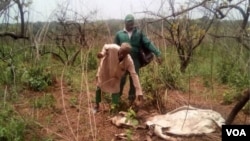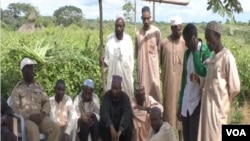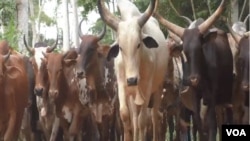Villagers in southern Cameroon are relocating following a series of lion attacks on their livestock. Cameroon authorities and wildlife conservationists are warning about the growing threat to endangered animals from human-wildlife conflict.
Forty-five-year-old rancher Ali Sambo, his wife, and three children fled their village of Djole on Saturday after lions attacked.
He said the lions killed 53 of their cows within two weeks in the villages of Adimbi, Djole and Djinga. He said he does not know how many he alone has lost.
Sambo is among dozens of people who fled to Ntui, a village 30 kilometers away on the outskirts of Yaounde.Cattle ranchers like Sambo, who have been losing their livestock to lions, fear that if they and their families remain in their villages, they could be next.
Sambo voices a common view among ranchers that the lions should be killed as the animals have devastated their livelihoods.
Kizito Ombgwa, a forest rancher deployed by Cameroon wildlife officials to the area, says their first mission is to make sure the population is safe. But he said the lions should also be secured and returned to their natural habitat.
He said the villagers should remain calm, avoid being isolated, and desist from coming out to fight back when the lions attack.
He said they suspect the lions came from overcrowded reserves like the Benoue, Kalfou, or Waza wildlife parks in northern Cameroon for greener pastures. He added it is also possible they came in from neighboring Gabon as some lions did in 2014.
Donnacien Oum, the highest ranking government official where the lions have been attacking, said authorities are prepared to compensate ranchers who lost their cattle.
But he said the population, especially cattle ranchers, should be patient. He said the civil protection department of Cameroon’s Ministry of Territorial Administration is preparing to compensate all those who have lost their livestock
Habitats under attack
Wildlife conservation groups say as the animals attack people and their property, so too are people attacking the animals and their habitats.
Increased population pressure and deforestation has transformed parts of Cameroon’s wildlife parks to farms and villages, leading to human-wildlife conflicts over living space and food.
Save the Cameroon Forest’s wildlife conservation expert Rigobert Bihina said communities need better incentives for development that also involve wildlife conservation.
He said the government and its development partners should pay particular attention to people who live in villages surrounding national parks. He said they can prevent destruction of animal habitats by funding revenue-generating activities like promoting agriculture and aquaculture and providing drinkable water.
In 2014, elephants and hippopotamuses killed several people and destroyed farms after being pushed out of Kalfou Park in northern Cameroon.
Southern Cameroon’s Campo Ma'an National Park in 2010 reported that elephants, monkeys, gorillas and other animals had shifted their migration because of commercial palm oil and rubber plantations.






